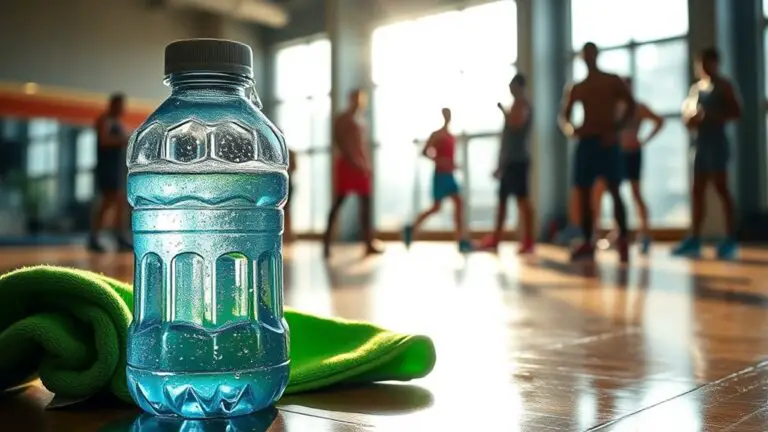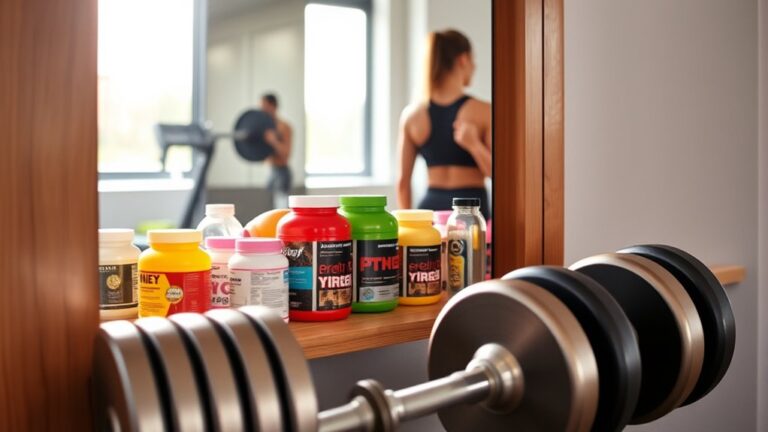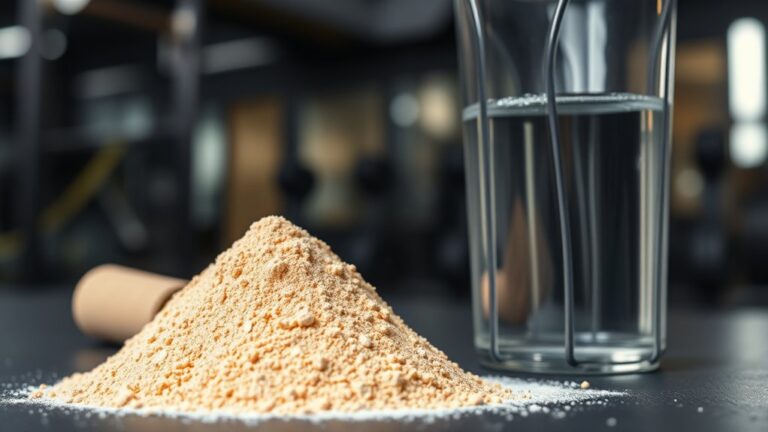What to Eat After a Gym Workout for Faster Recovery
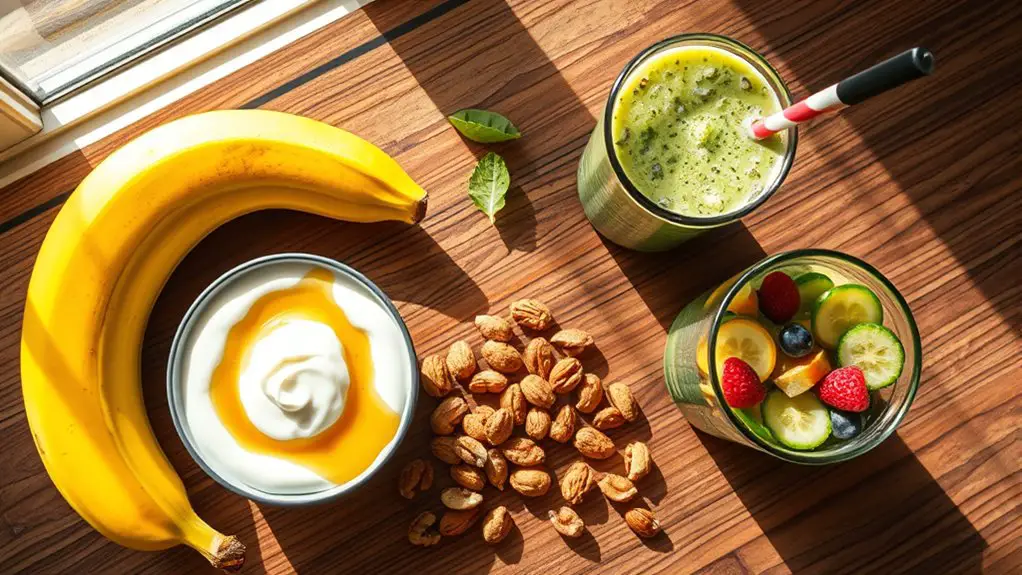
After a gym workout, it’s vital to refuel with a balanced meal rich in proteins and carbohydrates within 30 to 60 minutes. Aim for a 3:1 ratio of carbs to protein, such as a smoothie with banana and protein powder or a turkey wrap with whole-grain tortillas. Hydration is essential too; replace lost fluids to aid recovery. Focus on these dietary strategies to enhance muscle repair and energy replenishment. Discover more excellent meal ideas and tips for best recovery.
The Importance of Post-Workout Nutrition
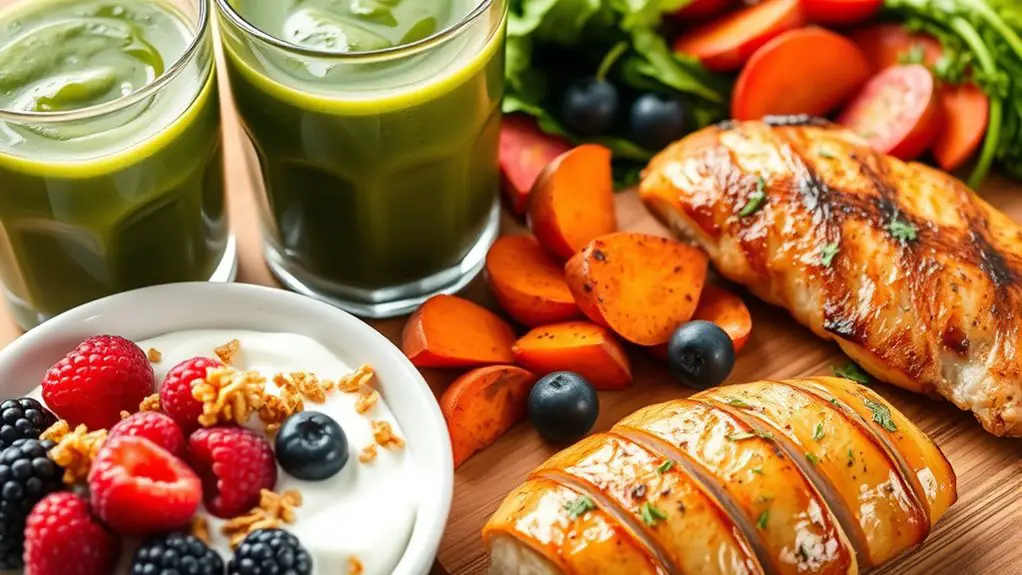
After you’ve pushed through a tough workout, it’s crucial to refuel your body with the right nutrients. Post-workout nutrition plays a critical role in recovery, particularly through a concept known as nutrient timing. Consuming the right nutrients shortly after your workout can greatly enhance muscle synthesis, helping you rebuild and repair muscle fibers that were stressed during exercise.
Research suggests that ideally, you should aim to consume a mix of protein and carbohydrates within 30 to 60 minutes post-exercise. This timing allows your body to efficiently utilize these nutrients, maximizing the recovery process and promoting muscle growth. Protein provides the amino acids necessary for muscle repair, while carbohydrates replenish glycogen stores, giving you energy for your next workout. Prioritizing these nutrients right after your session guarantees that you’re not only recovering effectively but also setting yourself up for future success in your fitness journey.
Ideal Macronutrient Ratios for Recovery
Refueling your body with the right macronutrient ratios can greatly enhance your recovery process. For ideal recovery strategies, aim for a ratio of about 3:1 carbohydrates to protein within 30 minutes post-workout. This timing is vital; nutrient timing plays a significant role in replenishing energy stores and repairing muscle tissue. Carbohydrates help replenish glycogen levels, while protein aids in muscle recovery and growth.
If you’ve engaged in intense or prolonged exercise, you might consider increasing your protein intake slightly, targeting a ratio closer to 4:1. This guarantees that your muscles receive the amino acids they need for effective repair. Additionally, don’t overlook healthy fats; while they’re not a priority immediately post-workout, they’re essential for overall recovery and should be included in your meals throughout the day. Remember, balancing these macronutrients can lead to quicker recovery and better performance in future workouts.
Top Foods for Replenishing Glycogen Stores
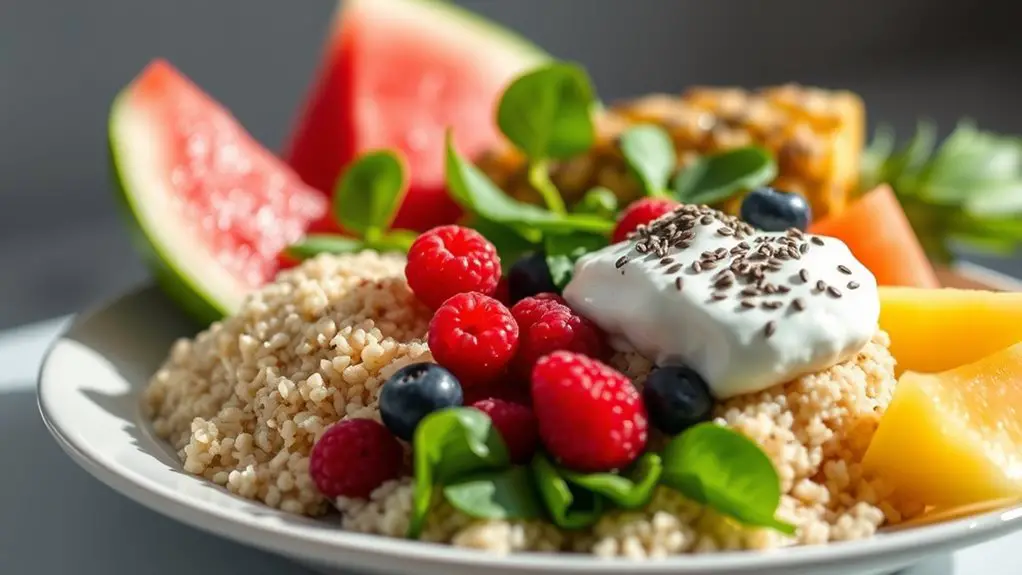
After a workout, replenishing your glycogen stores is essential for recovery and performance. Consuming the right carbohydrates can help speed up this process, ensuring you’re ready for your next session. Timing your intake is equally important, as it can maximize the benefits of glycogen restoration.
Importance of Glycogen Recovery
When you complete a gym workout, your body’s glycogen stores are often depleted, making it essential to replenish them for ideal recovery and performance. Glycogen synthesis is critical to fuel restoration, allowing your muscles to recover and prepare for the next workout. Consuming carbohydrates post-exercise aids in replenishing these stores, leading to improved endurance and overall workout effectiveness.
| Food Source | Glycogen Replenishment Benefits |
|---|---|
| Bananas | Quick source of natural sugars |
| Sweet Potatoes | Complex carbs for sustained energy |
| Brown Rice | Provides fiber and essential nutrients |
| Oatmeal | Ideal for slow digestion and energy |
| Quinoa | Complete protein and carbs combo |
Incorporating these foods can optimize your recovery, ensuring you’re ready for your next session.
Best Carbohydrate Sources
Post-workout nutrition plays an essential role in how effectively your body can recover, particularly when it comes to replenishing glycogen stores. Choosing the right carbohydrate sources can make a significant difference. Whole grains like brown rice and quinoa bowls provide sustained energy. Sweet potatoes and pasta salads are excellent for restoring glycogen levels as well. For a quick fix, consider rice cakes and energy bars, which are convenient and effective. Don’t forget about delicious treats: oatmeal cookies and banana bread can satisfy your sweet tooth while delivering carbs. Fruit smoothies and chia pudding offer hydration alongside nutrients, making them fantastic post-workout options. Incorporating these foods into your recovery plan will help you bounce back stronger.
Timing for Optimal Effect
To maximize your recovery, it’s essential to pay attention to the timing of your post-workout nutrition. Consuming a meal or snack within 30 to 60 minutes after exercising can considerably enhance glycogen replenishment. This window is vital because your muscles are most receptive to nutrient absorption right after a workout. Aim for a combination of carbohydrates and protein to optimize recovery. Additionally, consider your meal frequency throughout the day; spreading your intake into smaller, frequent meals can further support glycogen replenishment and muscle repair. To effectively recover, prioritize quick-absorbing carbohydrates, like fruits or sports drinks, alongside a protein source, ensuring your body gets what it needs when it needs it most. Your muscles will thank you!
Protein Sources for Muscle Repair
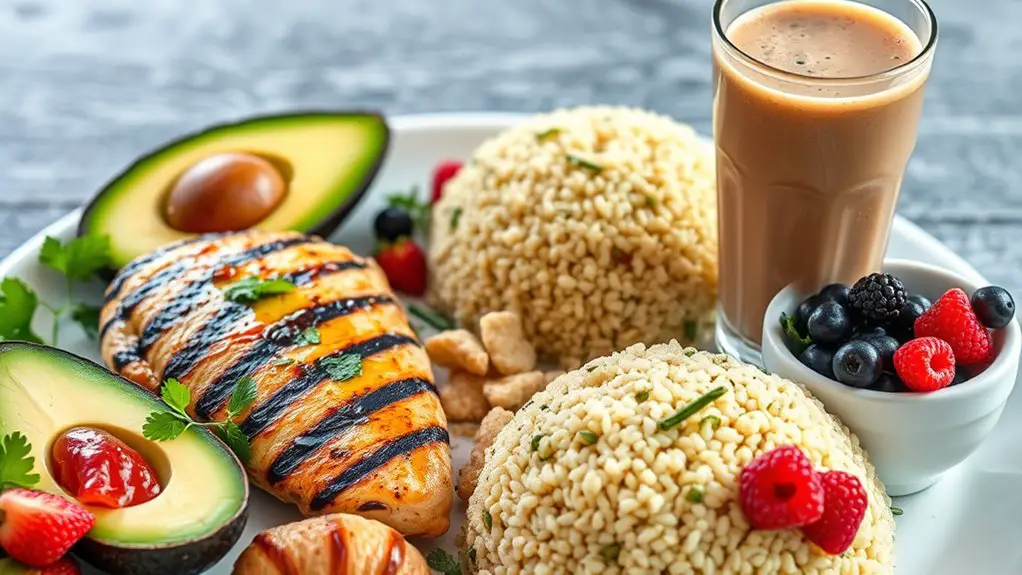
After a workout, your muscles need protein for repair and growth. You can choose from a variety of sources, including animal-based proteins like chicken and fish, or plant-based options like beans and quinoa. Each has unique benefits, so it’s important to find what works best for your dietary needs and fitness goals.
Animal-Based Proteins
While you may be tempted to reach for quick snacks, focusing on animal-based proteins can greatly aid in muscle repair following a workout. Lean meats like chicken and turkey are excellent sources of high-quality protein, essential for muscle recovery. Dairy products, such as Greek yogurt or cottage cheese, provide not only protein but also calcium for bone strength. Don’t overlook the egg benefits; eggs are a complete protein source, rich in essential amino acids that support muscle repair. Additionally, fish varieties like salmon and tuna offer omega-3 fatty acids, which can help reduce inflammation and promote recovery. Incorporating these animal-based proteins into your post-workout meal can considerably enhance your recovery process and overall performance.
Plant-Based Proteins
If you’re looking for effective post-workout nutrition, plant-based proteins offer a wealth of options that can support muscle repair and recovery. Consider incorporating plant-based sources like legumes, which provide essential amino acids. You can enjoy various protein alternatives, such as vegan shakes made from pea or hemp protein. Don’t overlook seed benefits; chia and flaxseeds are excellent additions to your meals. Explore nut varieties, like almonds and walnuts, for healthy fats and protein. Tofu recipes and tempeh uses can add versatility to your diet, while quinoa dishes serve as a complete protein source. Finally, try plant protein blends that combine multiple sources for ideal recovery to meet your dietary needs.
Hydration: The Key to Recovery
Hydration plays an essential role in recovery, especially since your body loses significant amounts of water through sweat during workouts. To optimize your recovery, it’s important to replenish lost fluids. Using effective hydration methods, such as drinking water or electrolyte-rich beverages, can help restore your body’s fluid balance.
Electrolyte balance is especially important after intense exercise, as electrolytes like sodium and potassium are crucial for muscle function and recovery. If you’ve sweat a lot, consider incorporating sports drinks or coconut water, which can provide both hydration and essential electrolytes.
Aim to drink at least 16-24 ounces of fluid for every pound lost during your workout. You might also want to monitor your urine color; pale yellow indicates proper hydration. By prioritizing hydration, you’ll enhance your recovery process and prepare your body for the next workout.
Timing Your Post-Workout Meal
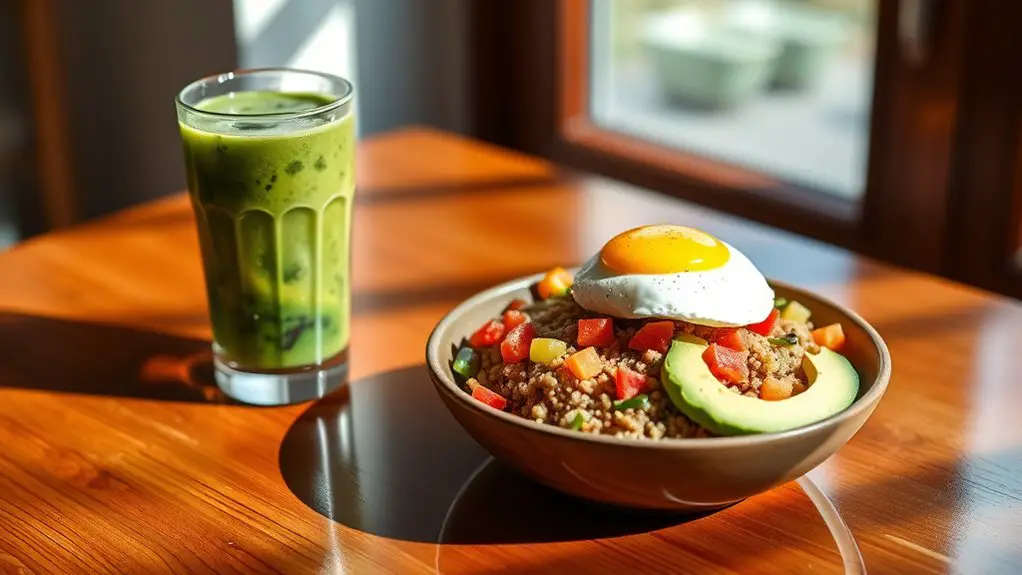
To maximize your recovery and muscle growth, it’s crucial to eat your post-workout meal within 30 to 60 minutes after exercising. This timeframe helps replenish glycogen stores and repair muscle tissue. Planning your meal prep in advance can make it easier to stick to this schedule. Here are three key reasons why timing matters:
- Muscle Recovery: Consuming protein shortly after your workout aids muscle repair and growth.
- Glycogen Replenishment: Eating carbohydrates quickly helps restore energy levels, enhancing your performance in future workouts.
- Reduced Muscle Soreness: A timely post-workout meal can help reduce soreness and improve overall recovery.
Consider keeping some easy-to-grab post workout snacks on hand, like protein bars or smoothies, to guarantee you don’t miss this critical window. By prioritizing your post-workout nutrition, you’ll support your fitness goals more effectively.
Sample Post-Workout Meal Ideas
After an intense workout, choosing the right post-workout meal can make a significant difference in your recovery and performance. You’ll want to focus on a combination of protein and carbohydrates. For a quick option, consider a protein-packed smoothie. Blend together spinach, banana, protein powder, and almond milk for a revitalizing recovery drink. If you prefer something solid, a turkey wrap with whole-grain tortillas and veggies is an excellent choice.
For snack options, Greek yogurt with berries offers a tasty balance of protein and carbs, while a handful of nuts and a piece of fruit provide healthy fats and quick energy. If you’re feeling adventurous, try these smoothie recipes: mix avocado with cocoa powder and a splash of almond milk for a chocolatey treat that fuels muscle repair. These meal ideas not only support recovery but also help replenish your energy levels effectively.
Frequently Asked Questions
Can I Skip Post-Workout Nutrition if I’m Not Hungry?
You might wonder if you can skip post-workout nutrition if you’re not hungry. While it’s natural to have fluctuations in post-workout hunger, nutrient timing plays an essential role in recovery. Even if you don’t feel like eating, your muscles need nutrients soon after exercise to repair and grow. Aim for a balanced snack or meal within a couple of hours post-workout to maximize recovery, enhance performance, and keep your energy levels steady.
Are Protein Shakes Better Than Whole Foods for Recovery?
Studies show that about 20-30 grams of protein post-workout can greatly enhance recovery. While protein shakes offer benefits like quick absorption and convenience, whole foods provide advantages such as essential vitamins and minerals. If you’re pressed for time, a shake might be ideal, but incorporating whole foods into your diet can lead to better overall nutrition. Ultimately, it’s about balancing both to optimize your recovery and health.
How Soon Should I Eat After a Workout?
You should aim to eat within 30 to 60 minutes after your workout to maximize recovery. This time frame is often referred to as the recovery window, where your body’s ability to absorb nutrients is heightened. Eating during this post workout timing can help replenish glycogen stores and repair muscle tissue effectively. While individual needs may vary, prioritizing nutrition shortly after exercising can greatly enhance your overall recovery process.
Is It Okay to Have Dessert After Exercising?
Imagine savoring a rich chocolate mousse or a creamy slice of cheesecake after your workout. It’s not just a treat; dessert can be a guilt-free indulgence when enjoyed mindfully. Research shows that satisfying cravings can boost mood and prevent binge eating later. If you’ve fueled your body well, a small dessert can complement your recovery, offering both joy and balance. Just remember, moderation is key to making it truly beneficial.
Can I Drink Alcohol After My Workout?
Yes, you can drink alcohol after your workout, but it’s important to take into account the alcohol effects on your body. Consuming alcohol can slow your recovery timeline by dehydrating you and impairing muscle repair. If you choose to drink, moderation is key. Aim to hydrate and refuel with nutrients first, then enjoy a drink if you want. Just remember that your overall recovery and performance might be impacted by your alcohol intake.


